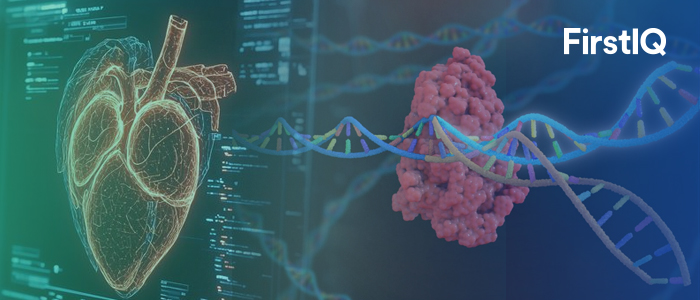Precision at the Core: CRISPR’s Role in Shaping Cardiovascular Medicine

Beyond the conventional medicine treatment for cardiovascular disease, gene editing is paving the way for fresh discoveries in the mechanisms underlying cardiovascular disease. A revolutionary potential of CRISPR-gene editing in cardiovascular disease with its unique of modifying the DNA material is opening new avenues for the future of cardiovascular treatment.
Tiny Models, Big Breakthroughs: CRISPR’s Success in Cardiac Mice Studies
- CRISPR-Cas9 has implicit to replace embryonic stem cell-based homologous recombination, with this reality it has come to a routine tool for generating genes of interest in mice.
- This genome editing in mice has enabled the identification genetic material which causes cardiomyopathies, along with this it has enabled modelling of physical gene mutations in heart.
- Adeno-associated virus (AAV) 9 encoding sgRNAs that target genes of interest to the Myh6-Cas9 mice was administered to complete cardiomyocyte-specific gene omission in one technique, which produced a transgenic mouse line that expressed SpCas9 under the control of the Myh6 protagonist (Myh6-Cas9).
- Another technique, known as CASAAV, employed Rosa26-Cas9-GFP animals with a Cre-inducible Cas9-P2A-GFP allele and an AAV9-sgRNA-cTnT (cardiac troponin T)-Cre vector, which, when controlled by the cTnT protagonist, produces both sgRNA and Cre recombinase against a target gene.
- Both strategies were successful in deleting genes specific to cardiomyocytes.
- In contrast to traditional conditional and inducible gene deletion, somatic gene editing offers a relatively rapid way to assess genetic function in the adult heart.
- However, AAV9 may not infect all cardiomyocytes, and deletions may be partial, as editing efficiency is strongly influenced by the AAV9 virus as well as the levels of sgRNA and Cas9 expression.
CRISPR-Cas9 genome editing holds great potential as a therapeutic approach, owing to its capability in producing permanent changes in the genome, to offer lifelong therapeutic effect.
Gene by Gene: CRISPR’s Expanding Role in Heart Health Research
- Marianna Fontana, MD, of University College London, UK, presented open marker phase 1 research on a single group at the American Heart Association in 2024 on a CRISPR-Cas9-grounded experimental treatment for transthyretin amyloidosis cardiomyopathy (ATTR-CM).
- The study with primary objective of assessing safety a pharmacodynamics of Transthyretin serum level, involving 36 patients, predominantly older men who have administered intravenous infusion for two hours.
- At 28 days, there was an 89% decrease in transthyretin, further persisting to 90% at 12 months. However, 34 out of 36 patients experienced some sought of adverse events, further investigation is ongoing in the phase 3 MAGNITUDE trial involving patients with ATTR-CM.
- Sarah Cuddy, MD, Brigham and Women's Hospital, Boston, said that “the study's findings are really promising and I find this trial has opened up the door for gene editing, a permanent approach to cardiac therapy.”
A permanent method to cardiovascular therapy, genome editing has been made possible by this trial's encouraging results.
Further, confirming in vivo gene editing’s significant potential in heart diseases with first human administration of VERVE-101 in Familial Hypercholesterolemia, cardiologist Dr. Sekar Kathiresan, co-founder of Verve Therapeutics stated, “For every 40 milligram/deciliter lowering of LDL cholesterol after a heart attack, you get a 22% reduction in risk of heart attack and death. Therefore, lowering LDL by 70%, as VERVE-101 has shown to do, massively decreases the risk of heart attack.”
Rewriting Cardiovascular Care: The CRISPR Outlook
Congenital heart defects, a genetic cardiac ailment that has no effective treatment, affect about 1% of newborns. However, what if a newborn with a cardiac defect might one day receive treatment before birth, before the illness shows symptoms?
In this future scenario, a doctor may give a child a vaccination that completely removes the genetic problems from their DNA. Although existing limitations are partial editing because of delivery issues, CRISPR's promise to offer lifelong therapeutic effects representing a revolutionary push towards genetic specificity in cardiovascular treatment.




